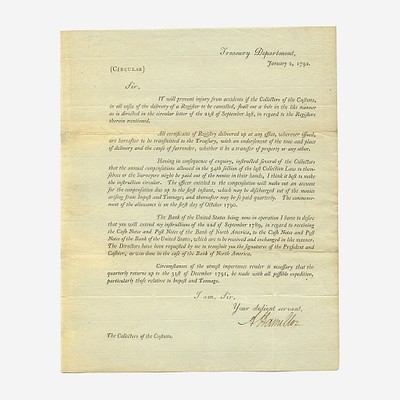[Hamilton, Alexander] [American Revolution] Printed Document
About Seller
2400 Market St
Philadelphia, PA 19147
United States
Established in 1805, Freeman’s Auction House holds tradition close, with a progressive mind-set towards marketing and promotion, along with access to a team of top experts in the auction business. And now with offices in New England, the Southeast, and on the West Coast, it has never been easier to ...Read more
Two ways to bid:
- Leave a max absentee bid and the platform will bid on your behalf up to your maximum bid during the live auction.
- Bid live during the auction and your bids will be submitted real-time to the auctioneer.
Bid Increments
| Price | Bid Increment |
|---|---|
| $0 | $25 |
| $500 | $50 |
| $1,000 | $100 |
| $2,000 | $200 |
| $3,000 | $250 |
| $5,000 | $500 |
| $10,000 | $1,000 |
| $20,000 | $2,000 |
| $30,000 | $2,500 |
| $50,000 | $5,000 |
| $100,000 | $10,000 |
About Auction
Oct 25, 2021
Freeman's is honored to present The Alexander Hamilton Collection of John E. Herzog, a single-owner sale of Alexander Hamilton material, on October 25. Curated by Darren Winston, Head of the Books and Manuscripts Department. Freeman's info@freemansauction.com
- Lot Description
(New York), September 27, 1785. Bifolium sheet, 13 1/4 x 8 1/8 in. (336 x 206 mm). Unpaginated. Printed Confederation Congress report, being: "By the United States in Congress assembled, September 27, 1785. The report of the grand committee being amended to read as follows; Resolved, That for the services of the present year, one thousand seven hundred and eighty-five, for the payment of one year's interest on the foreign and domestic debt..." Bottom corner of third and fourth pages replaced where Charles Thomson's signature was clipped, evidence of which can be seen on first and second pages from the ghost of his signature (see copy of same document in Library of Congress); gutter reinforced; creasing from original folds; scattered short closed tears along edges; offsetting on first page recto; abrasion on first page verso affecting some words at bottom; tape repair at fore-edge fold of third page; addressed on final page "For State of Pennsylvania," docketed to same, "1785/September/27th/1785/Requisition of Congress for." Evans 19287
A rare Confederation Congress report summarizing the state of the federal debt after the American Revolution and the efforts by the essentially powerless Congress to pay it down. This printing was apparently done in a small quantity, and distributed to the several state delegations in Congress, this seemingly being the copy for the State of Pennsylvania due to the address and docketing on the final page.
This document breaks down the interest due on the debt into two categories—foreign and domestic—with the interest on foreign debt broken down by country and the interest on domestic debt broken down by which debts have been liquidated, which are uncanceled, and what money is still due in states such as Maryland, Virginia, North Carolina, South Carolina, and Georgia. Following this breakdown is a short table outlining quota amounts needed to be requisitioned from each state to meet the interest obligations of these several loans, totaling close to $3 million. The remainder of the document communicates detailed instructions to the individual state's continental loan officers for issuing and settling loan certificates.
This rare document encapsulates the effort of the Confederation Congress to pay down the staggering debt incurred from the Revolution, what first Secretary of the Treasury Alexander Hamilton would later call in his famous report on Public Credit (see lot 10) the "price of liberty." Funding the debt was a recurring problem under the Articles of Confederation, and since Congress lacked the authority to levy taxes, and due to its poor credit an inability to borrow, the country's finances were in a shambles. With the passage of the Constitution two years later, the creation of the Treasury Department the following year, and the confirmation of Hamilton as its first secretary, the situation began to improve. Hamilton's plan to improve public credit and consolidate state debts under his assumption plan laid the groundwork for America's financial revolution.
No copies found ever being offered at auction. Rare.
- Shipping Info
-
No lot may be removed from Freeman’s premises until the buyer has paid in full the purchase price therefor including Buyer’s Premium or has satisfied such terms that Freeman’s, in its sole discretion, shall require. Subject to the foregoing, all Property shall be paid for and removed by the buyer at his/ her expense within ten (10) days of sale and, if not so removed, may be sold by Freeman’s, or sent by Freeman’s to a third-party storage facility, at the sole risk and charge of the buyer(s), and Freeman’s may prohibit the buyer from participating, directly or indirectly, as a bidder or buyer in any future sale or sales. In addition to other remedies available to Freeman’s by law, Freeman’s reserves the right to impose a late charge of 1.5% per month of the total purchase price on any balance remaining ten (10) days after the day of sale. If Property is not removed by the buyer within ten (10) days, a handling charge of 2% of the total purchase price per month from the tenth day after the sale until removal by the buyer shall be payable to Freeman’s by the buyer. Freeman’s will not be responsible for any loss, damage, theft, or otherwise responsible for any goods left in Freeman’s possession after ten (10) days. If the foregoing conditions or any applicable provisions of law are not complied with, in addition to other remedies available to Freeman’s and the Consignor (including without limitation the right to hold the buyer(s) liable for the bid price) Freeman’s, at its option, may either cancel the sale, retaining as liquidated damages all payments made by the buyer(s), or resell the property. In such event, the buyer(s) shall remain liable for any deficiency in the original purchase price and will also be responsible for all costs, including warehousing, the expense of the ultimate sale, and Freeman’s commission at its regular rates together with all related and incidental charges, including legal fees. Payment is a precondition to removal. Payment shall be by cash, certified check or similar bank draft, or any other method approved by Freeman’s. Checks will not be deemed to constitute payment until cleared. Any exceptions must be made upon Freeman’s written approval of credit prior to sale. In addition, a defaulting buyer will be deemed to have granted and assigned to Freeman’s, a continuing security interest of first priority in any property or money of, or owing to such buyer in Freeman’ possession, and Freeman’s may retain and apply such property or money as collateral security for the obligations due to Freeman’s. Freeman’s shall have all of the rights accorded a secured party under the Pennsylvania Uniform Commercial Code.
-
- Buyer's Premium



 EUR
EUR CAD
CAD AUD
AUD GBP
GBP MXN
MXN HKD
HKD CNY
CNY MYR
MYR SEK
SEK SGD
SGD CHF
CHF THB
THB![[Hamilton, Alexander] [American Revolution] Printed Document](https://s1.img.bidsquare.com/item/l/9470/9470994.jpeg?t=1MwoEV)
![[Hamilton, Alexander] [American Revolution] Printed Document](https://s1.img.bidsquare.com/item/s/9470/9470994.jpeg?t=1MwoEV)











